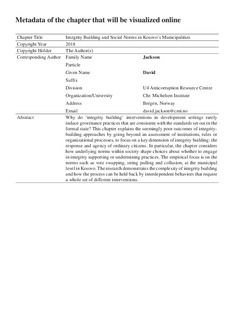| dc.contributor.author | Jackson, David | |
| dc.date.accessioned | 2018-06-06T14:01:03Z | |
| dc.date.available | 2018-06-06T14:01:03Z | |
| dc.date.issued | 2018-01-01 | |
| dc.identifier | oai:www.cmi.no:6538 | |
| dc.identifier.citation | in Kubbe; Englebert: Corruption and Norms. Why Informal Rules Matter. Palgrave Macmillan pp. 211-238 | |
| dc.identifier.isbn | 978-3-319-66254-1 | |
| dc.identifier.uri | http://hdl.handle.net/11250/2500647 | |
| dc.description.abstract | Why do 'integrity building' interventions in development settings rarely induce governance practices that are consistent with the standards set out in the formal state? This chapter explains the seemingly poor outcomes of integrity- building approaches by going beyond an assessment of institutions, rules or organizational processes, to focus on a key dimension of integrity building: the response and agency of ordinary citizens. In particular, the chapter considers how underlying norms within society shape choices about whether to engage in integrity supporting or undermining practices. The empirical focus is on the norms such as vote swapping, string pulling and collusion, at the municipal level in Kosovo. The research demonstrates the complexity of integrity building and how the process can be held back by interdependent behaviors that require a whole set of different interventions. | |
| dc.language.iso | eng | |
| dc.publisher | Palgrave Macmillan | |
| dc.relation | Corruption and Norms. Why Informal Rules Matter | |
| dc.relation.ispartof | Corruption and Norms. Why Informal Rules Matter | |
| dc.relation.ispartofseries | Corruption and Social Norms | |
| dc.relation.ispartofseries | Corruption and Norms. Why Informal Rules Matter | |
| dc.relation.uri | https://www.cmi.no/publications/6538-integrity-building-andsocial-norms-inkosovos | |
| dc.title | Integrity Building and Social Norms in Kosovo’s Municipalities | |
| dc.type | Chapter | |
| dc.identifier.cristin | 1654074 | |
